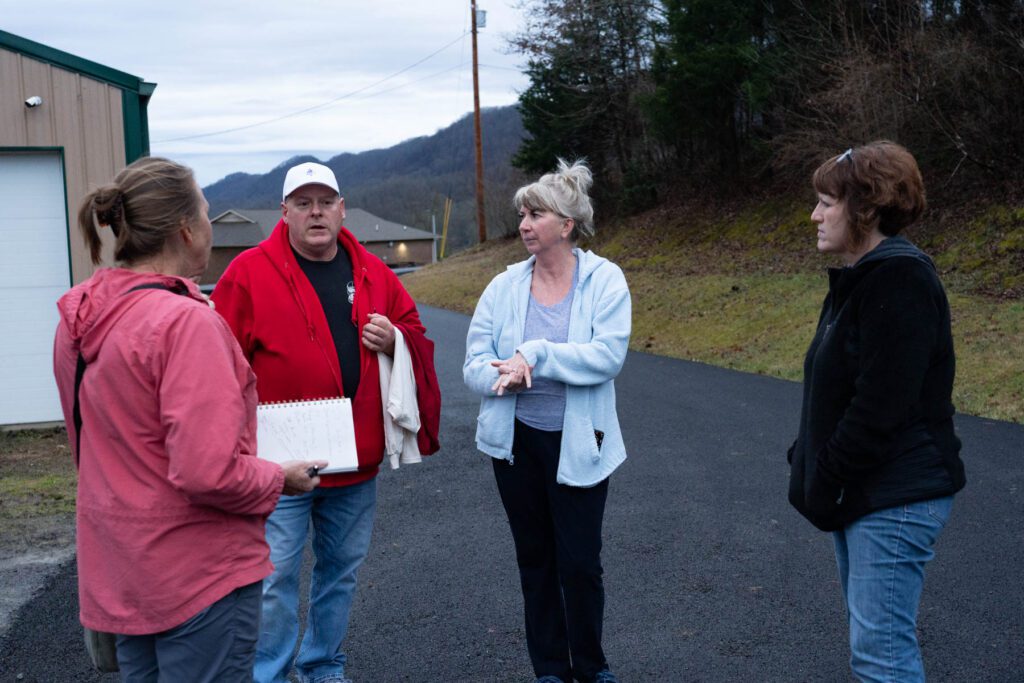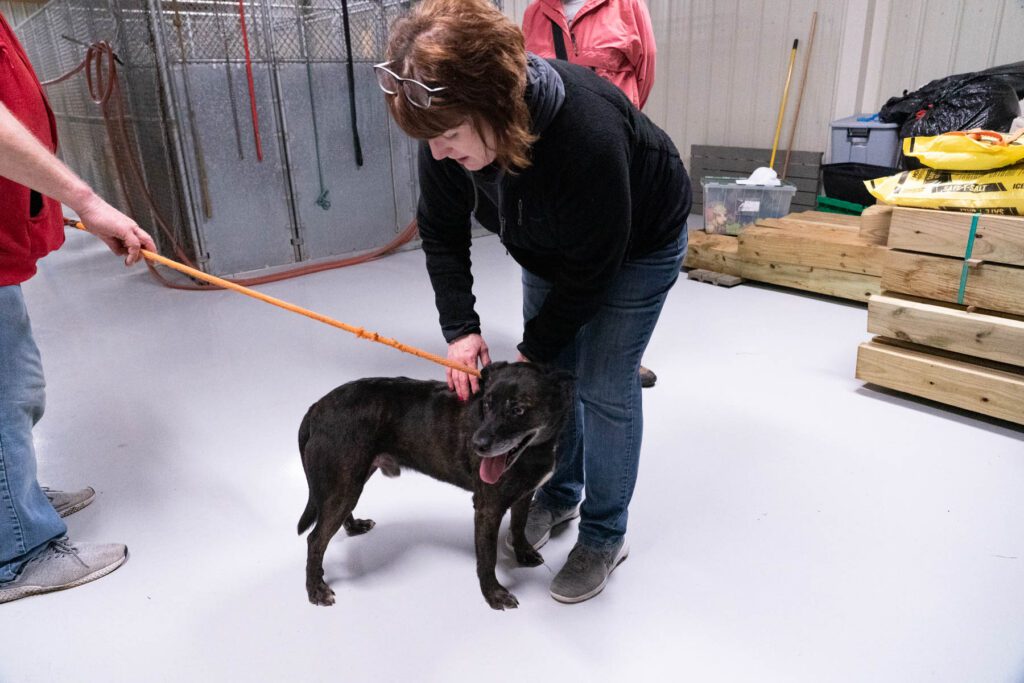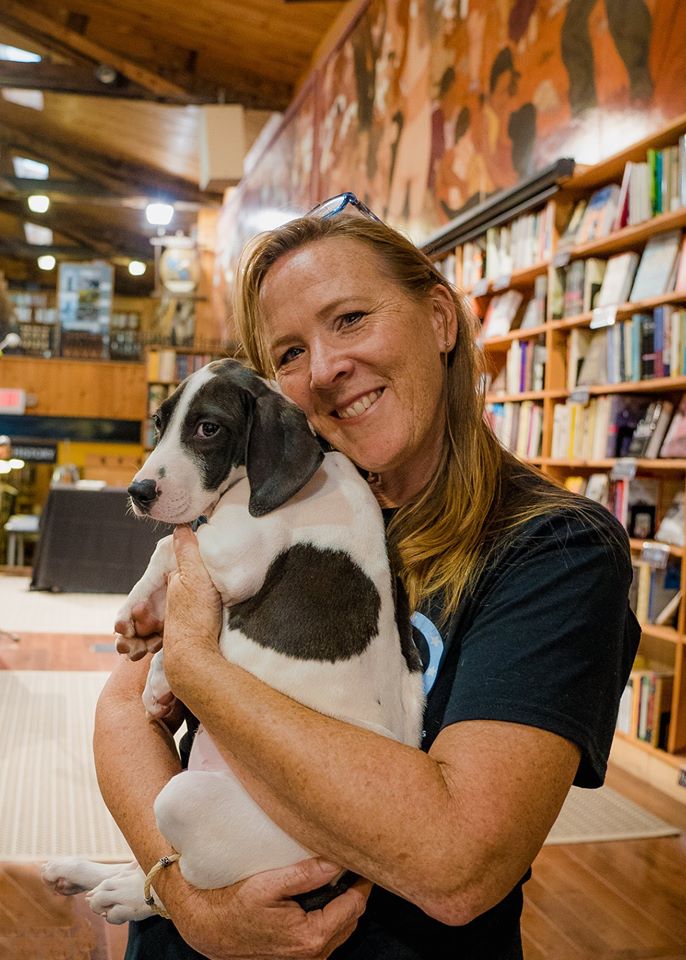If they aren’t working, he and his wife Jackie are rescuing; it’s their life, Billy explained to me on our second visit to Scott County this past February.
Jackie added, “We have no social life. Everything is the dogs.”
And this weighs on their hearts because they worry what will happen if they were to step away. Something I always wonder when I meet people like them—volunteers who devote all they have to saving the lives of dogs who don’t belong to them and shouldn’t be their responsibility.

Billy and Jackie lead the Scott County Humane Society, the nonprofit responsible for saving the dogs that land in the Scott County Animal Shelter. The Humane Society saved 382 dogs last year. 330 of them were pulled from Scott County Animal Shelter, 52 were dogs surrendered directly to the Humane Society. It’s because of this incredible effort that Scott County Animal Shelter can claim to be a ‘no-kill’ shelter. The shelter itself took in 450 dogs and adopted out 70. You do the math and sort out what would happen without the Humane Society.
Before they go on vacation, Billy works like crazy to get as many dogs out as possible so they don’t have to worry about the fate of the shelter dogs while they are gone. If they can empty enough kennels, hopefully there are spaces for the dogs that come in while none are going out.
The Humane Society rarely does adoptions. They transfer the dogs they pull from the Scott County shelter to other rescues who find homes for the dogs. The work – evaluating the dogs, documenting them (pictures, videos, bios), temperament testing, getting them to the vet to be spayed/neutered, microchipped, vaccinated, and heartworm tested, networking them to rescues, and then arranging for transport (most often driving them) – is handled by Billy and Jackie.
We met with Billy, Jackie, and Allison on a rainy night on our way home from North Carolina. Billy pulled out dog after dog so that Nancy could take pictures, his affection for them seeping out his pores. The dogs were all friendly and beyond thrilled to be out of their kennels.








Normally, the only time they get out is while the kennels are being cleaned, which means they spend more than 23 hours a day in the narrow kennels with metal walls and cement floors. The dog runs face each other with a floor that slopes toward the drain that runs between them down the center of the building.
The only thing the dogs see every day are the walls around them and the dog in the run across from them. It’s a stressful set up and the noise created in the metal pole building is overwhelming. Several of the dogs we met had been there for months, and Ringo, an Akita mix had been there since almost six.
Besides Billy and Jackie, there are a few others who help when they can. Allison is a local teacher who fosters hound dogs for them and is an advocate for their work.

Right now, like so many rescues, the Humane Society is barely keeping their heads above water. As soon as they get a dog out, three more take its place.
Scott is an open-intake shelter and the staff (one ACO, plus two employees) doesn’t ask questions or counsel people who turn their dogs in, so the Humane Society rarely knows the reasons why dogs are in the shelter or any of their history. Their mission is to simply get them out of the shelter alive.
Scott County has a very hard history. They were killing 95% of their dogs (they don’t take cats) before the Humane Society got involved. So, as hard as things seem here, they are better. Obviously, they could be a lot better.
I asked Jackie what will happen when she and Billy retire. She turns 60 this year and Billy isn’t far behind. She shook her head and said that’s what haunts her. She doesn’t know. She assumes things will go back to the way they were before the Humane Society got involved. Jackie grew up in Scott County. She loves this community, and clearly, it breaks her heart to think that they will let their animals suffer and die.



This story isn’t unfamiliar. Too often the fates of animals depend on volunteers. There is no plan for what happens if volunteers get tired, get busy, get sick, or simply have enough.
There are so many solutions to situations like this, but communities must come together to change practices and policies for animal sheltering. They have to change their mindset from being simply ‘animal control’ to being an animal shelter.
Animal shelters shelter animals. They provide a safe, temporary home. A shelter should not be a place where animals are held in harsh conditions, only to be killed unless their owners reclaim them or volunteers step in and rescue them. That’s the definition of a dog pound.



It seems crazy to me that any community would find this system acceptable. Every community must decide whether they want their tax dollars to fund an animal shelter or a dog pound. It’s tax dollar that pay for dog food and the drugs that euthanize.
Besides volunteers, what the Humane Society needs most is money to pay for the veterinary and transport expenses. It costs a lot to save a dog. Currently, Scott County tax dollars don’t pay for that.
If you’d like to help, visit their website to donate: www.scotthumane.com.

Until each one has a home,
Cara
If you want to learn more, be sure to subscribe to this blog. And help us spread the word by sharing this post with others. Visit our website to learn more.
You can also help raise awareness by following/commenting/sharing us on Facebook, Instagram, YouTube, Tik Tok, and the Who Will Let the Dogs Out podcast.
Learn more about what is happening in our southern shelters and rescues in the book, One Hundred Dogs & Counting: One Woman, Ten Thousand Miles, and a Journey Into the Heart of Shelters and Rescues (Pegasus Books, 2020). It’s the story of a challenging foster dog who inspired me to travel south to find out where all the dogs were coming from. It tells the story of how Who Will Let the Dogs Out began. Find it anywhere books are sold. A portion of the proceeds of every book sold go to help unwanted animals in the south.

For more information on any of our projects, to talk about rescue in your neck of the woods, or become a WWLDO volunteer, please email whowillletthedogsout@gmail.com or carasueachterberg@gmail.com.
And for links to everything WWLDO check out our Linktree.



Michaela Miller
I SAY THAT THERE SHOULD BE ALOT MORE CHEAPER OPTIONS AND EVEN FREE CLINICS TO SPAY&NEUTER CATS&DOGS FOR PEOPLE TO CUT DOWN ON THE POPULATION! ALL AREAS SHOULD HAVE PLACES THAT DO VET WORK AT A DISCOUNT LIKE DR.JEFF IN COLORADO. IT COST ME A FEW HUNDRED DOLLARS JUST TO GET A CHECK UP& BLOOD WORK FOR EACH OF MY 5 PETS. NOW THEY WANT 400 TO OVER 700$TO CLEAN A 12 LB CATS TEETH!!! ITS REDICULUS I SAY TO KEEP A PET HEALTHY!!!! MY CATS GUMS ARE BLEEDING, WHAT DO I DO WHEN I DONT HAVE THAT KIND OF MONEY?? ITS HALF OF MY MONTHLY INCOME!!!!! IM IN A BAD SITUATION BUT MY VETERINARY CLINIC ONLY CARES ABOUT MONEY 💰!!!!
Dawn Mothershead
Y can’t useless people under stand spay and neuter. And don’t get me started on heart meds. People should be treated as they do there pets and I use that term loosely, because 2 them, they not family. They think it is all fun and games. This is a living being. I was a vet tech 4 11v12 years, I did every thing I could 4 the pets and I mean things that these people would think I nuts. But u know that kind of whatever u want 2 call them is fine with because I’m sure u would b nicer than me , anyway they r not worth your time. They just care until the pet gets sick. Then u r a bad person 4 wanting $s and shitty person. Never mind u tried 2 teach them what they need 2 know about the pet. I got burnt because of things like this. But I will always stand 4 the Animals. It’s there world 2. Together we can save them all.
Ariana
I wish all those dogs a home and a good rest of there lives!
Ariana
I wish all those dogs a home and a good rest of there lives!